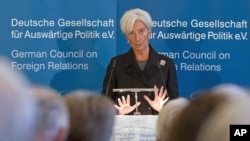The chief of the International Monetary Fund is calling for European governments to take more aggressive action to resolve the continent's debt crisis.
The IMF's managing director, Christine Lagarde, said Monday that the 17 nations that use the common euro currency should boost the size of their financial rescue fund, lower already-low lending rates and adopt policies to bolster economic growth.
She said the eurozone's current temporary $570 billion bailout fund could be added to the planned permanent $650 billion rescue fund set to take effect in July, something European leaders have not been intending to do. Lagarde said the extra money could help cover future debt problems beyond the bailouts already secured by Greece, Ireland and Portugal.
"We feel that a stronger firewall is needed. Why? Because without it, countries like Italy and Spain, for instance, that are fundamentally, fundamentally able to repay their debt could potentially be forced into a solvency crisis by abnormal financing costs. And this would have disastrous implications for systematic stability,'' said Lagarde.
The IMF leader said the Washington-based agency is expecting slower economic growth across the globe this year and would make specific projections on Tuesday.
She said even the world's largest economies can expect a downturn this year, with weaker economies hit harder.
"Capital flows to emerging markets have already dropped off, and growth as I said is expected to be lower, even in the most vibrant part of the world economy. Low-income countries in particular are especially vulnerable," said Lagarde.
Lagarde said European and world leaders face a "defining moment" in dealing with economic concerns. She said it is "not about saving any one country or region," but rather "saving the world from a downward economic spiral."
The eurozone's finance ministers are meeting in Brussels to work on a continent-wide plan to tighten controls on the spending of individual governments.
The discussions are centering on Greece, whose leaders have yet to complete talks with the country's private creditors on terms of a 50 percent cut in the debt Greece owes them. The debt forgiveness could save the country more than $129 billion, but agreement on the pact has proved elusive.
Greece is seeking a $168 billion bailout, its second in two years. But European leaders say they will not approve the rescue package without the country's agreement on the private debt relief and imposition of more unpopular austerity measures.
Meanwhile, Spain said its economic conditions have worsened. The Madrid government said it expects its economy to shrink by 1.5 percent this year, and grow by only two-tenths of a percent in 2013
Some information for this report was provided by AP, AFP and Reuters.




